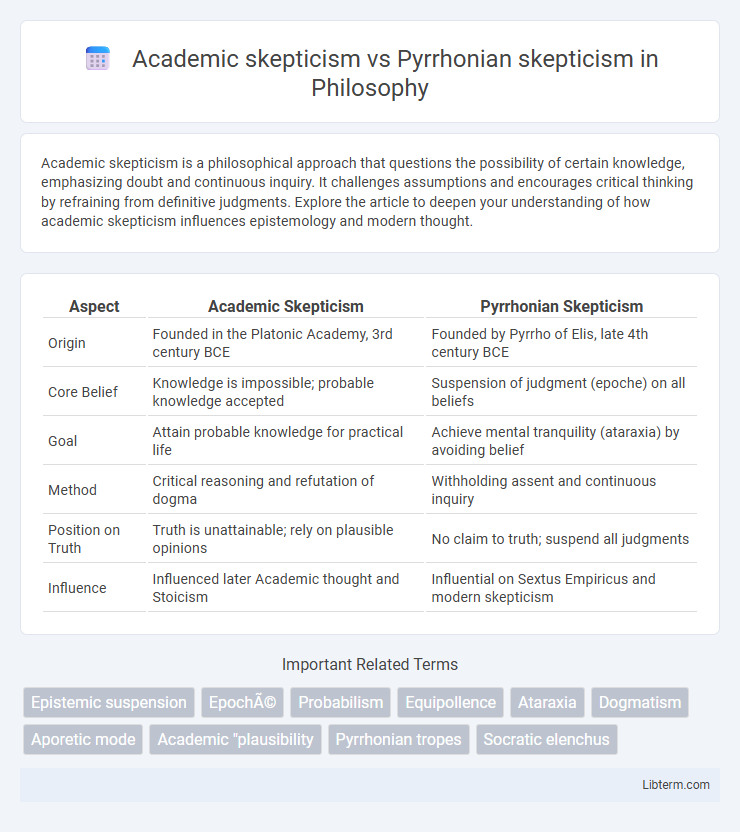Academic skepticism is a philosophical approach that questions the possibility of certain knowledge, emphasizing doubt and continuous inquiry. It challenges assumptions and encourages critical thinking by refraining from definitive judgments. Explore the article to deepen your understanding of how academic skepticism influences epistemology and modern thought.
Table of Comparison
| Aspect | Academic Skepticism | Pyrrhonian Skepticism |
|---|---|---|
| Origin | Founded in the Platonic Academy, 3rd century BCE | Founded by Pyrrho of Elis, late 4th century BCE |
| Core Belief | Knowledge is impossible; probable knowledge accepted | Suspension of judgment (epoche) on all beliefs |
| Goal | Attain probable knowledge for practical life | Achieve mental tranquility (ataraxia) by avoiding belief |
| Method | Critical reasoning and refutation of dogma | Withholding assent and continuous inquiry |
| Position on Truth | Truth is unattainable; rely on plausible opinions | No claim to truth; suspend all judgments |
| Influence | Influenced later Academic thought and Stoicism | Influential on Sextus Empiricus and modern skepticism |
Introduction to Philosophical Skepticism
Academic skepticism, originating with Plato's Academy, asserts the possibility of knowledge but maintains that certainty is unattainable, emphasizing probable knowledge based on reasoned judgment. Pyrrhonian skepticism, founded by Pyrrho, advocates for suspension of judgment (epoche) on all matters to achieve ataraxia, promoting a life free from disturbance by doubting the possibility of any knowledge. Both traditions critically examine the limits of human knowledge, contributing foundational perspectives to the broader discourse of philosophical skepticism.
Defining Academic Skepticism
Academic Skepticism, rooted in the Platonic Academy, asserts that certainty is unattainable and promotes probabilistic reasoning rather than absolute knowledge. It challenges the reliability of sense perception and dogmatic beliefs, emphasizing cautious judgment based on plausible evidence. Distinct from Pyrrhonian Skepticism, which suspends all belief to achieve mental tranquility, Academic Skepticism maintains that some beliefs can be more justifiable than others through critical inquiry.
Origins and Historical Context of Academic Skepticism
Academic skepticism originated in the Platonic Academy during the 3rd century BCE, founded by Arcesilaus, who challenged the Stoic doctrine of certain knowledge by asserting that humans can only achieve probable knowledge. This school of thought emerged as a response to the dogmatic philosophies of the Hellenistic period, emphasizing critical inquiry and suspension of judgment based on the limits of human cognition. In contrast, Pyrrhonian skepticism, developed by Pyrrho of Elis, embraced radical uncertainty and epoche (suspension of belief) without committing to any claims, representing a more radical form of skepticism that influenced later skeptical traditions.
Core Principles of Academic Skepticism
Academic skepticism fundamentally asserts that absolute certainty is unattainable, promoting a probabilistic approach to knowledge where beliefs are held tentatively based on the best available evidence. This school, rooted in the Platonic Academy, emphasizes critical inquiry and the suspension of judgment (epoche) until sufficient justification arises. Unlike Pyrrhonian skepticism, which advocates for complete suspension of belief to achieve mental tranquility, Academic skeptics accept a degree of probable knowledge while recognizing the limits of human cognition.
Defining Pyrrhonian Skepticism
Pyrrhonian Skepticism, founded by Pyrrho of Elis, emphasizes suspending judgment (epoche) on all beliefs to achieve mental tranquility (ataraxia) by maintaining a position of perpetual inquiry and doubt. Distinct from Academic Skepticism, which asserts that knowledge is impossible and promotes probabilistic beliefs, Pyrrhonian Skepticism refrains from making any knowledge claims, advocating for continuous questioning without committing to any truth. Its core method involves dialectical examination and living in accordance with appearances rather than dogmatic assertions.
Historical Development of Pyrrhonian Skepticism
Pyrrhonian skepticism originated in the 4th century BCE with Pyrrho of Elis, emphasizing epoche, or suspension of judgment, to achieve tranquility. Unlike Academic skepticism, which asserts that certain knowledge is impossible but often maintains probabilistic beliefs, Pyrrhonian skepticism advocates for withholding assent to all dogmatic claims. Its historical development influenced later Hellenistic philosophy and was systematized by Sextus Empiricus in the 2nd century CE, shaping the foundation of classical skeptical thought.
Key Tenets of Pyrrhonian Skepticism
Pyrrhonian skepticism centers on suspending judgment (epoche) to achieve mental tranquility (ataraxia) by withholding assent to all non-evident beliefs. Unlike Academic skepticism, which asserts that certain knowledge is impossible and maintains probabilistic beliefs, Pyrrhonism refrains from any dogmatic claims, emphasizing continuous inquiry and equal weight (isostheneia) among opposing arguments. Its key tenets include epoche, ataraxia, and the practice of living without fixed beliefs to avoid disturbance caused by dogmatic assertions.
Comparative Analysis: Academic vs Pyrrhonian Skepticism
Academic skepticism, rooted in the New Academy, asserts that knowledge is impossible to attain, promoting probabilistic reasoning as a practical guide. Pyrrhonian skepticism, founded by Pyrrho, refrains from making any dogmatic claims, advocating epoche or suspension of judgment to achieve mental tranquility. Comparative analysis reveals that while Academic skeptics engage in dialectical arguments to challenge epistemic certainty, Pyrrhonian skeptics maintain radical skepticism by continuously withholding assent and avoiding commitments to beliefs.
Influence on Modern Epistemology
Academic skepticism, rooted in the Platonic Academy, asserts that certain knowledge is unattainable, promoting probabilistic reasoning and influencing modern epistemology by emphasizing critical inquiry and doubt. Pyrrhonian skepticism advocates for suspension of judgment (epoche) and mental tranquility (ataraxia), shaping contemporary approaches to epistemic humility and the limits of human cognition. Both traditions contribute foundational perspectives on skepticism's role in evaluating knowledge claims and fostering philosophical inquiry.
Conclusion: Lasting Legacy and Contemporary Relevance
Academic skepticism, rooted in the Platonic Academy, concluded that knowledge is unattainable but probable beliefs guide action, influencing Renaissance and modern epistemology. Pyrrhonian skepticism, founded by Pyrrho, embraces epoche (suspension of judgment), advocating mental tranquility (ataraxia), shaping contemporary philosophical approaches to doubt and inquiry. Both traditions contribute enduring frameworks for critical thinking, challenging absolute certainty and informing debates in epistemology and cognitive science.
Academic skepticism Infographic

 libterm.com
libterm.com